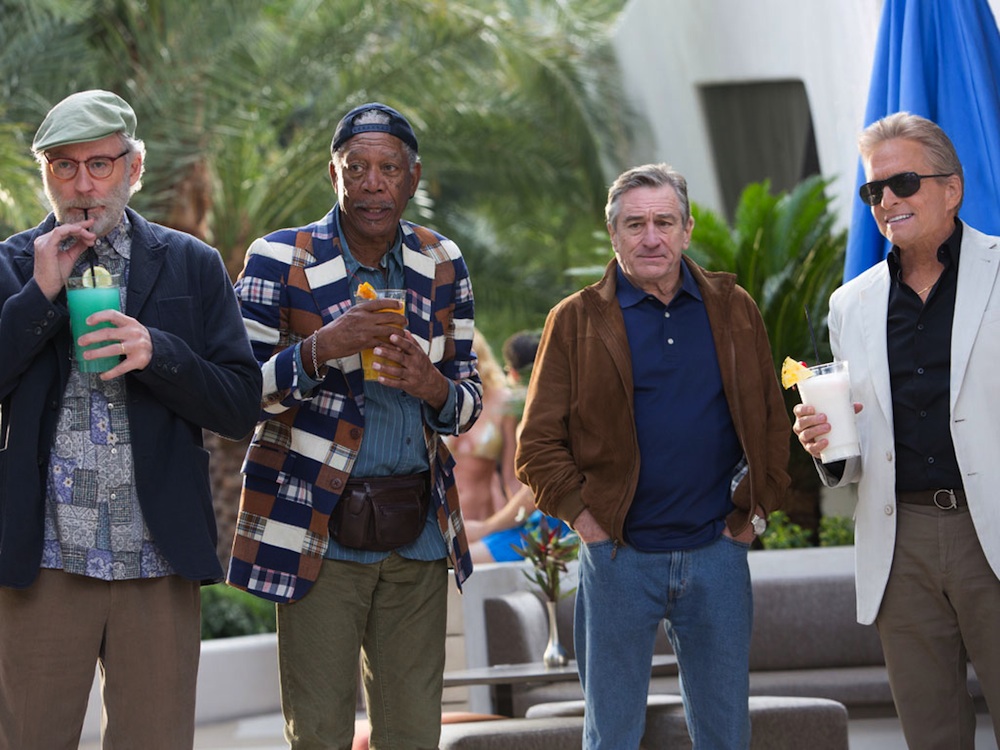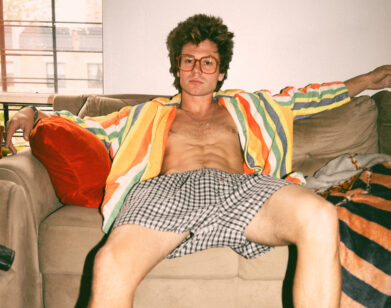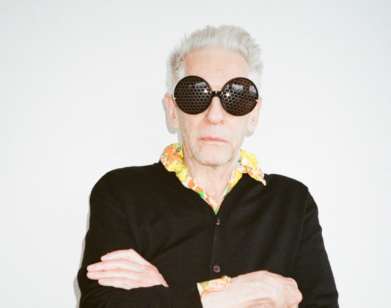French Lessons with Kevin Kline

ABOVE (L-R): KEVIN KLINE, MORGAN FREEMAN, ROBERT DE NIRO, AND MICHAEL DOUGLAS IN LAST VEGAS.
Kevin Kline is in Paris filming My Old Lady with Dame Maggie Smith and Kristin Scott Thomas. It is his last week of production on his third consecutive film. Once the film is wrapped, Kline will fly home to New York and “take a bit of a break.”
The purpose of our conversation is to discuss Last Vegas, the first of the three films to open. In it, Kline plays Sam, one of four 60-something friends from the old Brooklyn neighborhood who reunite (some more reluctantly than others) in Sin City for the bachelor party of the group’s “ladies’ man.” Each character is discontent with his daily life: Paddy (Robert De Niro) is still mourning the loss of his wife and childhood sweetheart; Archie (Morgan Freeman), feels imprisoned in his son’s house following a divorce and a stroke; Billy (Michael Douglas) just proposed to a woman half his age during a eulogy for his mentor; and Sam is prematurely stuck in a Florida retirement community. Shenanigans—swimsuit contests, clubbing, a 50 Cent cameo—ensue.
When talking to an actor with as long (40-plus years) and as varied a career as Kline’s, however, it is hard to stick to one subject.
EMMA BROWN: Do you speak French at all?
KEVIN KLINE: Bah, oui. That was it. That was my entire vocabulary: Bah, ouiiiii. Do you speak French?
BROWN: Yes.
KLINE: Ah, voilà! [in French] I’ve made two movies—one in which I’ve played a role in French, but my character mostly spoke in English, with Meg Ryan called French Kiss (1995), but six years ago I made a film entirely in French with Sandrine Bonnaire (Queen to Play). [in English] Do you know that actress?
BROWN: No, I don’t.
KLINE: Oh, Sandrine Bonnaire is a great, great French actress. I was offered this film that was shot in Corsica and it was to play an American, but who had lived in France for 25 years. It was a great challenge but my French improved in the process. But the role I’m playing in this movie is a guy who doesn’t speak any French and when he does attempt it, he butchers it. So I’m talking to the crew, trying to improve my French, but then when the camera rolls I have to drop it all.
BROWN: Were you worried at all that it would make you worse?
KLINE: No. No. I’m able to separate. [laughs] Luckily, at this stage of my life I can separate when the camera’s rolling, when I’m acting, and when I’m just living.
BROWN: When did you first learn French? In school?
KLINE: In school; in junior high school and high school. I had six years of it. But, as in most schools, you don’t learn how to speak it. I was just talking to our first assistant director, who, like most French people, every time we have a word like ‘”actor,” they say “hactor” and “hand”—”do you want ham hand butter?” I said, “No, it’s not ‘hand butter.'” She said that she was taught that! That her professor said you must pronounce anything that begins with an “a” with an “h.” So I learned how to conjugate irregular verbs, and a lot of grammar, and I could read French but I couldn’t speak it. And I certainly couldn’t speak it when it was spoken back to me, especially with Parisians, who as you know speak a mile a minute. But that takes immersion and gradually getting better at it.
BROWN: Do people speak to you in French? Every time I go to Paris, the second they hear me speak English to someone they refuse to speak to me in French.
KLINE: I know. I hate it when you order something in French from the waiter and he talks back to you in English, such a French put-down. But I’m making a movie, so everyone’s friendly and very complimentary about one’s attempt to speak the language. And very helpful too—my driver was just teaching me some expressions on the way home from the set.
BROWN: Are you up-to-date on your slang?
KLINE: Oh, boy, yeah. They love teaching you slang.
BROWN: Verlons?
KLINE: Oh no, no, no. Just filth, mostly. I love “enculer les mouches.” Do you know that expression?
BROWN: [laughs] No, I don’t.
KLINE: Oh, it’s so vivid and descriptive. It’s argot for “you’re being too particular about something.” Like if the continuity woman is saying, “Actually, your middle finger and your first finger were separated by a quarter of an inch when you were holding the cigarette, blah, blah, blah” and you’re like, “T’encule les mouches!”
BROWN: Have you used it yet?
KLINE: Oh, several times. [laughs] Our continuity woman is a real mouches encule-er. But it always makes her laugh, when I say it.
BROWN: It’s probably the plosive, but there’s something so satisfying about saying “putain.”
KLINE: Putain? Oh, god, I just can’t stop saying it. “Oh, putain!” [laughs] It just falls right out. “Oh, putain!” Aren’t you shocked at how many of their idiomatic expressions are the same ones? Like my driver was just explaining to me that “he knew Paris like the back of his hand.”
BROWN: I’ve never really thought of those. So, Last Vegas!
KLINE: Oh, yes.
BROWN: When’s the last time you’ve been to a bachelor party?
KLINE: I’ve never been. I just came from Las Vegas where we had a press junket and a lot of people asked that question. And all four of us said we had never been to one.
BROWN: Not even your own?
KLINE: Good god, no. No.
BROWN: Have you been to Las Vegas before recreationally?
KLINE: Never. No. So the whole thing was appropriately fish-out-of-water. If you want to label it as a genre, they’re old-fish-out-of-water.
BROWN: You seem far too young to be playing such a role.
KLINE: Well, thank you. Yes. I’ve always been told that I don’t look my age and I certainly don’t act it. But I’m only two or three years younger than Michael, I know. And three years younger than Bob, who just turned 70.
BROWN: Did you lord your youth over them?
KLINE: I tried not to; I didn’t want to rub it in. Especially given the fact that it was such a small difference. I think the idea was that we were all neighborhood buddies—we weren’t exactly the same age.
BROWN: I was watching one of your interviews about the film, and you were talking about “the cost of real friendship.”
KLINE: Oh, nonsense. Well, what I meant to say was, “the joys and the pleasures of longterm, lasting friendships.” But also one of the first things that struck me in the screenplay when I read it was what Bob De Niro’s character does to Michael. One risks a friendship to go up to a fiancée and say, “He doesn’t really love you.” And to tell him that. And to tell her that. I mean, whoa! And then push him in a swimming pool, on top of that. I think that’s one of the things that comes out—we sort of straighten each other out. Certainly Bob’s character reads us all the riot act in that one tirade about, “Do you think this is fun? I miss my wife every minute of every day and this guy just wants to cheat on his wife and this one is living some ludicrous dream of lost youth.” He really calls us out. Granted, it’s coming from a very angry place, but there’s truth in everything he says. The stakes are very high—it’s pretty dramatic stuff. That’s what I meant by saying the cost of friendship. Not all friendship has to be that expensive. But I think the film, being the film, dramatizes that and exaggerates it somewhat. That’s what movies are.
BROWN: What do you think makes someone a good actor?
KLINE: Empathy? With some people it’s a natural talent that you’re born with. A willingness to play. You have to be able to, if not sympathize, at least empathize with characters. I can think of actors I’ve met over the years who don’t seem terribly empathetic, in life. [laughs] But I think it’s a worthwhile ingredient for an actor. Helpful.
BROWN: Do you feel like you’re always improving as an actor?
KLINE: Yes. It may not show, but in terms of the process of doing it. It reminds me of a story about the cellist Pablo Casals—he was one of the greatest cellists of the 20th century. He was famous for beginning every day by playing all six Bach unaccompanied cello suites. And someone, Mr. Casals’ wife, said, “Why do you insist on playing all six suites each day?” And he said, “Because I think I’m getting better.” I think it’s really easy to lapse into bad acting at any given moment. But I find that the more I’ve done it, the more I see some improvement. Or I don’t see it, because I tend not to watch myself, but I feel it.
BROWN: Do you have a touchstone against which to measure yourself? Tongue-twisters?
KLINE: Yes, every day I do three tongue-twisters and a couple of situps. No. None of that. I suppose when I go back to the theater and do Shakespeare, that keeps your instrument in tune. And exercises one’s mind and vocal apparatus and physical apparatus. All at once.
BROWN: Is there a role that you haven’t played yet that you’d like to?
KLINE: I can’t think of one, really. There’s a couple I’d like to do over in the Shakespeare canon. I only did Hamlet twice, and the second one was better than the first one. I’m little old now, but that was a practice in the old days, to go at it two or three times. There are some genres that I’ve never done. I’ve never done a film noir, [but] it’s not something I stay up nights dreaming of doing. I’ve never done an action movie, have I?
BROWN: Wild Wild West was sort of an action movie.
KLINE: Well, it was kind of an action movie, except he was a guy who didn’t like action, if I could avoid it. Same as the character in The Road to El Dorado (2000)—a guy who’s like “Ooh, looks like there’s trouble down there. Let’s not go.” I mean action like a real sort of James Bond or Rambo or something like that. I don’t think I’m going to be cast in one tomorrow, but if you threw out some genres, I might say, “Yeah, I’ve never done that, that might be fun.” But one chooses what one does based on the quality of the script. I would never call my agent and say “Don’t send me a script unless it’s a film noir, or a period adventure story. It’s got to be pre-1800s.” No.
BROWN: When you’re a film actor, you aren’t in control of which take they use. Do you try and do every take a little differently? Or do you try to control your performance as best you can by deciding how you want to do the take and sticking with it?
KLINE: I suppose you could divide actors into two groups: one who knows what he wants to do and does the same thing take after take, and then there are those like me, who like to explore and experiment and see where it goes. It’s much riskier and you have to trust your director much more. And I’ve worked with actors who very cleverly can protect their performance by doing it the same every time. I just don’t work that way.
BROWN: Is it tempting to suggest to the director, “Oh, I thought that one was the best”?
KLINE: Oh, absolutely. In fact I was very spoiled because my first film, Sophie’s Choice (1982), I would go to the dailies and talk to (director) Alan Pakula. After a couple days, I would say, “The first part of the second take, the middle part of Take One, and the last part of Take Three, were the best, don’t you think?” And he’d say, “Absolutely.” It was a great conversation, because it meant that we were like-minded about where the character was going, or where it needed to go and what was coming across. A lot of directors don’t like the actors coming, but I think it’s very instructive.
BROWN: And did you realize that it was an unusual connection while it was happening, or did you have a rude awakening when doing other films?
KLINE: Sophie’s Choice? Oh, I loved it. It was thrilling. I was so lucky. I mean, to be working with the people I was working with, on that material. I don’t even know if a movie like that could get made today. It was a great, great privilege. A real treat. And people say—when I say “Oh, it was so much fun”—”How could it be fun?” Because it was exhilarating, working on that material with those people.
LAST VEGAS COMES OUT THIS FRIDAY, NOVEMBER 1.






